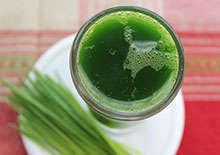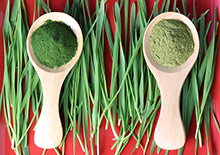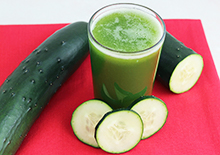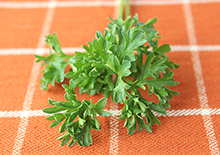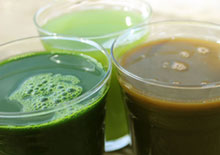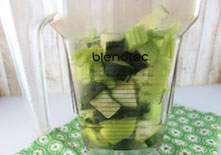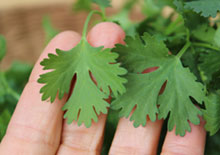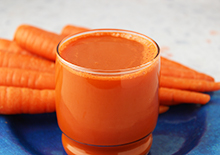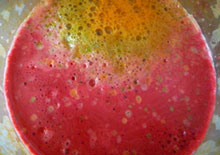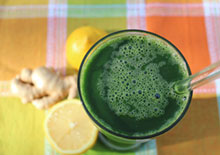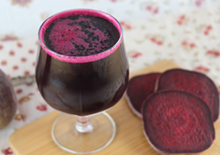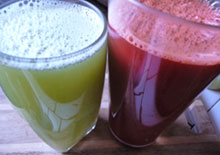- Home
- Super Juicing
- Non-Cruciferous Green Leafy Vegetables
Non-Cruciferous Green Leafy Vegetables, Green Juicing When Hypothyroid
Intro | Thyroid Disorders | List of Cruciferous Vegetables | When Best to Avoid | Non-Cruciferous Options | Non-Cruciferous List | Precautions
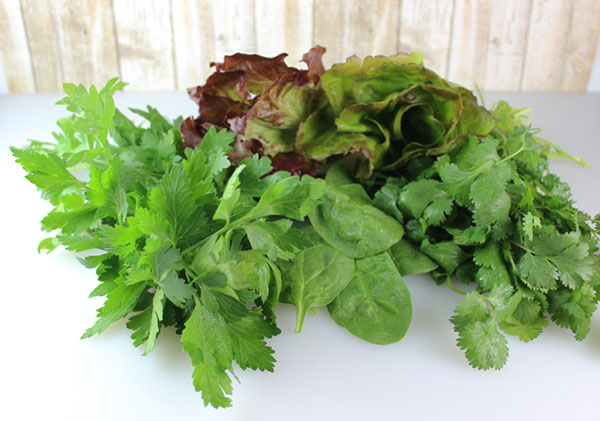
Don't want to drink green juice because you have an underactive thyroid? While this might limit you from eating the wide assortment of greens and sprouts from the family of cruciferous vegetables, there are fortunately other options.
At the bottom of this page, we have put together a list of non-cruciferous green leafy vegetables to refer to when making your homemade green juices or other juicing recipes.
Although the cruciferous types are considered to be highly nutritious, with a number of studies indicating their protective influence (*), large quantities when consumed in their raw state have been shown to be potentially health diminishing to someone with a thyroid disorder.
Why are Cruciferous Vegetables Bad for Thyroid Disorders?
Table of Contents
Intro | Thyroid Disorders | List of Cruciferous Vegetables | When Best to Avoid | Non-Cruciferous Options | Non-Cruciferous List | Precautions
The term "cruciferous vegetables" refers to the common cultivars in the Brassicaceae or Cruciferae family with cross-bearing flowers, hence their other name "crucifers."
They include a number of common vegetables such as cabbage, broccoli, brussels sprouts and cauliflower as well as a long list of leafy green varieties such as kale, collard, watercress, mustard, bok choy and arugula.
Also called "brassicas", these varieties possess sulfur-containing compounds called glucosinolates which turn to goitrogens, like goitrin. This conversion process occurs when raw plant fibers are chewed, blended or juiced through a juicer.
Basically, goitrogens can interfere with iodine uptake. They have been shown to reduce the production of thyroid hormones, like thyroxine, which can negatively impact those with an already underactive thyroid or hypothyroid. (*)
This condition is an endocrine system disorder whereby the thyroid doesn't produce an adequate amount of thyroid hormones. It is often associated with a dietary iodine deficiency, but can also be caused by other issues.
In some research, a "high consumption of cruciferous vegetables" is associated with thyroid cancer for those with an already low-iodine intake.
List of Cruciferous Vegetables and Greens
Cruciferous Vegetables
Broccoli
Brussels Sprouts
Cabbage
Cauliflower
Kohlrabi
Maca
Radish
Turnip
Rutabaga
Cruciferous Greens
Arugula
Bok Choy
Broccoli Sprouts
Collard Greens
Fenugreek Sprouts
Kale
Mizuna
Mustard Greens
Watercress
When It's Best to Avoid Concentrated Amounts of Crucifers
Many health experts now seem to agree that small amounts of crucifers added to a balanced diet are not going to negatively impact an underactive thyroid, especially when the vegetables are heated which dramatically lowers goitrogen content.
However, it is often recommended to avoid drinking green juices with a high concentration of green leafy vegetables from the brassica family, if you have low iodine levels or have a thyroid disorder.
Again, avoiding excessive intake of these greens is especially the case when they are consumed in their RAW state, as would be the case when making fresh homemade green juices and even raw soups or green smoothies.
In one review, discussing possible toxicants involved in thyroid dysfunction, it is in fact recommended to "avoid consumption of raw cruciferous vegetables."
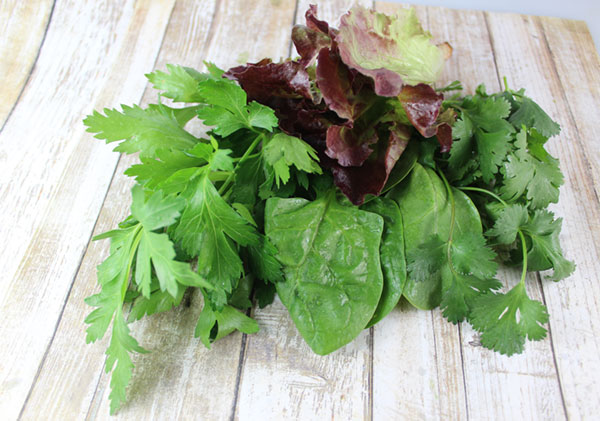
Non-Cruciferous Green Leafy Vegetable Options
Since most common leafy greens fall into this crucifer category, as you can see from the list above, it can be very helpful to have a secondary list of other options if you are someone trying to reduce intake.
Fortunately, there are a handful of chlorophyll-rich selections to choose from.
Non-Cruciferous Green Leafy Vegetables List
These non-cruciferous green leafy vegetables can be juiced with other non-crucifers like celery and cucumber so that you can enjoy all the benefits of green juicing without having to be concerned about taking in excess goitrogen content and interfering with iodine uptake.
Non-Cruciferous Leafy Greens
Beet Greens
Chicory
Cilantro
Dandelion
Endive
Gongura
Lambsquarters
Lettuces
Lovage
Moringa
Parsley
Purslane
Radicchio
Spinach
Sunflower sprouts
Swiss Chard
Wheatgrass
Some are less known varieties not frequently available worldwide, like moringa and gongura, but other selections are conductive to vegetable gardens, wild foraging and DIY sprouting methods.
Precautions:
If have a thyroid disorder, are pregnant, nursing, taking prescribed medications or have a serious medicinal illness, it is best to seek the advice of your healthcare provider before adding large quantities of green juice to your daily diet.

